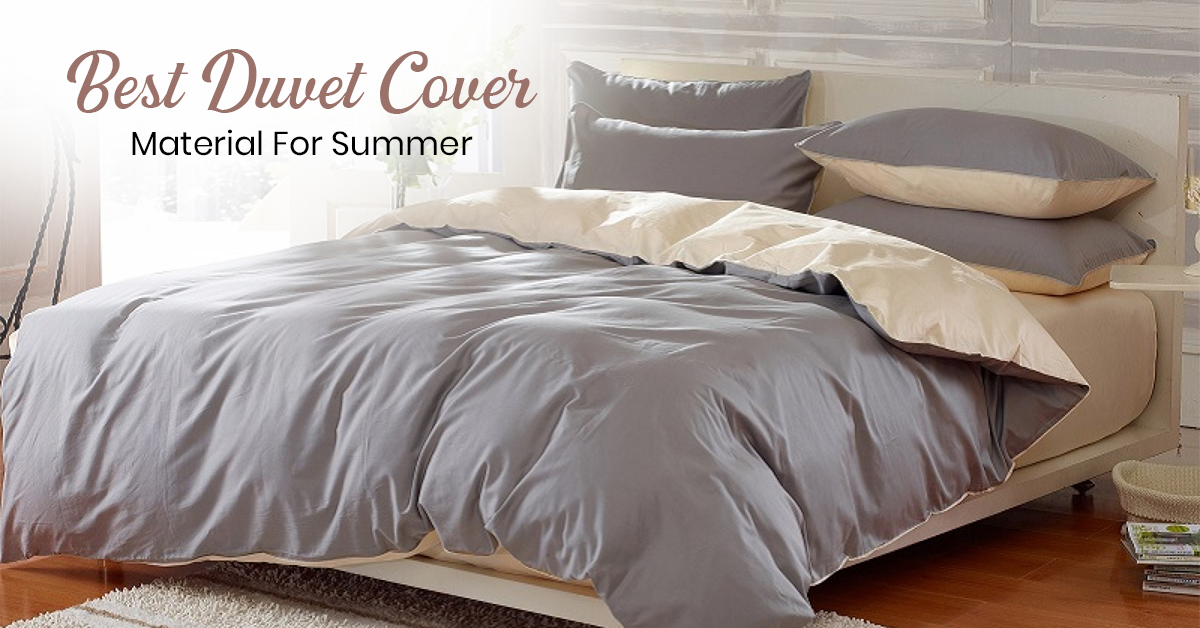Welcome to the ultimate guide on choosing the best duvet cover material for summer! As the temperatures rise, finding the right bedding becomes crucial to ensure you enjoy a restful, comfortable night's sleep. Summer nights can be tricky—too hot, sticky, and sometimes uncomfortable. But fear not! With the right duvet cover material, you can transform your sleep experience into a cool, refreshing escape from the summer heat. In this blog post, we'll explore various duvet cover materials, what makes them ideal for summer, and how they can enhance your sleep quality.
How To Choose The Right Duvet Cover Material For Summer?
Several factors influence sleep quality, including room temperature, humidity, and bedding. When summer nights are warmer, selecting a duvet cover made from the right material can significantly improve your comfort and sleep quality. The right duvet cover material helps regulate your body temperature, wicks away moisture, and provides a soft, comfortable touch against your skin. When choosing a duvet cover material for those warm summer nights, let's dive into what you need to consider.
Breathability
Breathability refers to how well a fabric allows air to circulate through it. A breathable duvet cover helps prevent overheating by allowing hot air to escape and cooler air to circulate. This is crucial in the summer when maintaining a cooler body temperature essential for a good night's sleep.
Moisture-Wicking Properties

Sweating is a natural response to heat but can make you feel clammy and uncomfortable. A duvet cover with excellent moisture-wicking properties draws sweat away from your body and helps it evaporate quickly, keeping you dry and comfortable throughout the night.
Cooling Effect
Some fabrics inherently feel cooler to the touch, which can be a game-changer during hot summer nights. This cooling effect can help you fall asleep faster and stay asleep longer by creating a comfortable sleeping environment.
Softness and Comfort
No matter the season, comfort is key. The softness of the duvet cover material contributes to how cosy and inviting your bed feels. For summer, you'll want a soft and cool material that provides a pleasant sensation against your skin.
Durability
Durability is an important factor, especially if you plan to use the same duvet cover year after year. High-quality materials can withstand frequent washing and use without losing shape or comfort.
Ease of Care and Maintenance
Summer often means more frequent washing to keep your bedding fresh and clean. Choosing a duvet cover material that is easy to care for can save you time and effort. Look for materials that are machine washable and resistant to wrinkling.
Best Duvet Cover Materials for Summer
Natural Fibers

Natural fibres are often the go-to for 2.5 tog summer duvet bedding due to their breathability and moisture-wicking properties. Let's look at some of the best natural fibres for duvet covers.
Cotton

Cotton is a classic choice for summer bedding. It's highly breathable, soft, and durable. Cotton duvet covers are available in various weaves, with percale and sateen being popular for their smooth, cool finishes. Percale cotton is crisp and cool, while sateen is silky and luxurious.
Linen

Linen is another excellent natural fibre for summer duvet covers. It's known for its exceptional breathability and moisture-wicking abilities. Linen has a slightly coarse texture but softens with each wash, becoming more comfortable over time. Its natural cooling effect makes it perfect for hot, humid nights.
Bamboo

Bamboo fabric is a newer player in the bedding market but has quickly gained popularity. Bamboo is naturally breathable, moisture-wicking, and has a cooling effect. It's also hypoallergenic and eco-friendly, making it an excellent choice for those with allergies or sensitive skin.
Synthetic Fibers

Synthetic fibres have made great strides in providing comfort and functionality comparable to natural fibres. Here are two synthetic materials that are great for summer duvet covers.
Microfiber

Microfiber is made from finely woven synthetic fibres, creating a soft, lightweight, and breathable fabric. It's known for its durability and ease of care, as it resists wrinkles and dries quickly. Microfiber duvet covers can be a cost-effective option without compromising on comfort.
Tencel (Lyocell)

Tencel, or lyocell, is a synthetic fibre made from wood pulp. It's highly breathable, moisture-wicking, and has a silky smooth texture. Tencel is also eco-friendly, as it's produced using environmentally responsible processes. Its cooling effect and luxurious feel make it a great choice for summer bedding.
Comparing Natural vs. Synthetic Duvet Cover Materials - Which is Better for Summer?
Choosing between natural and synthetic duvet cover materials can be challenging, as both have unique advantages. Here's a quick comparison to help you decide which is better for your summer needs:
Natural Fibers
Pros:
- Highly breathable
- Excellent moisture-wicking properties
- Generally more eco-friendly
- Naturally hypoallergenic (e.g., bamboo)
Cons:
- It can be more expensive
- It may require more maintenance (e.g., ironing linen)
Synthetic Fibers
Pros:
- Often more affordable
- Durable and easy to care for
- Advanced moisture-wicking and cooling technologies
Cons:
- It may not be as breathable as natural fibres
- Potential for static and pilling
Ultimately, the best choice depends on your personal preferences and priorities. If you value natural, eco-friendly materials and are willing to invest more in your bedding, natural fibres like cotton, linen, and bamboo are excellent choices. If you're looking for a more budget-friendly, low-maintenance option, synthetic fibres like microfiber and Tencel offer great comfort and functionality.
Conclusion
Selecting the right duvet cover material for summer can significantly improve your sleep quality. By considering factors such as breathability, moisture-wicking properties, cooling effect, softness, durability, and ease of care, you can find the perfect plain duvet cover to keep you cool and comfortable all summer. Whether you prefer the natural comfort of cotton, linen, and bamboo or the innovative features of microfiber and Tencel, there's a duvet cover material to suit your needs.
FAQs
What is the coolest duvet cover material for summer?
Linen and bamboo are often considered the coolest duvet cover materials for summer due to their natural breathability and moisture-wicking properties. Both materials help regulate body temperature and provide a cooling effect, making them ideal for hot, humid nights.
How often should I wash my summer duvet cover?
It is recommended that you wash your duvet cover every one to two weeks during the summer. Frequent washing helps remove sweat, oils, and allergens, keeping your bedding fresh and hygienic. Always follow the care instructions on the label to maintain the quality and longevity of your duvet cover.
Can I use a duvet cover year-round?
Yes, you can use a duvet cover year-round. However, depending on the season, you may want to switch between different materials. Lighter, breathable materials like cotton, linen, and bamboo are ideal for summer, while thicker, warmer materials like flannel or velvet can provide extra cosiness during winter.
How do I prevent my duvet cover from wrinkling?
To prevent wrinkles, promptly remove your duvet cover from the dryer, spread it out, or put it back on the duvet insert while it's still slightly damp. Some materials, like linen, naturally wrinkle more than others, but a quick iron or steam can help smooth any creases. Using a fabric softener or dryer sheets can reduce static and minimise wrinkles.


